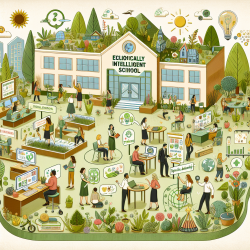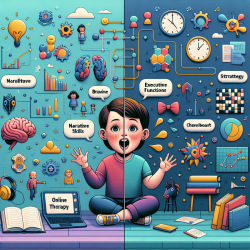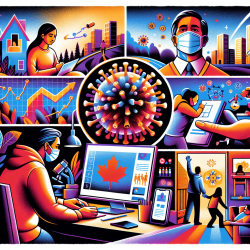Introduction
In the realm of education, the professional development of teachers is paramount. The research article "Environmental Factors for the Advancement of Teachers’ Self-Efficacy in Professional Development" offers a fresh perspective on how teachers can enhance their self-efficacy by leveraging the socio-ecological model. This approach, which emphasizes the interplay between personal and environmental factors, can be instrumental in shaping an ecologically intelligent school (EIS) that fosters teacher development.
The Ecologically Intelligent School (EIS) Model
The EIS model is built upon the socio-ecological framework, which considers various layers of influence on teacher self-efficacy:
- Interpersonal Layer: This includes communication with colleagues and students. Effective communication is vital for creating a supportive environment that boosts teachers' confidence and self-efficacy.
- Organizational Layer: School climate plays a crucial role in shaping teachers' perceptions of their abilities. A positive school climate can significantly enhance teachers' self-efficacy.
- Policy and Societal Values Layer: Feeling valued at the national level impacts teachers' self-efficacy. Recognition and appreciation from the broader educational ecosystem can empower teachers to perform better.
Implementing the EIS Model
To implement the EIS model effectively, schools should focus on the following strategies:
- Enhancing Communication: Schools should encourage open communication channels among teachers and between teachers and students. This can be achieved through regular meetings, collaborative projects, and feedback sessions.
- Fostering a Positive School Climate: Creating a supportive and inclusive school environment is essential. This involves promoting mutual respect, providing resources for professional growth, and recognizing teachers' achievements.
- Recognizing Teachers' Contributions: At the policy level, acknowledging teachers' efforts and providing them with opportunities for professional development can boost their self-efficacy.
Encouraging Further Research
While the EIS model provides a robust framework for enhancing teacher self-efficacy, further research is needed to explore its application in diverse educational settings. Practitioners are encouraged to delve deeper into the socio-ecological factors that influence teacher development and adapt the EIS model to their unique contexts.
To read the original research paper, please follow this link: Environmental Factors for the Advancement of Teachers’ Self-Efficacy in Professional Development.










